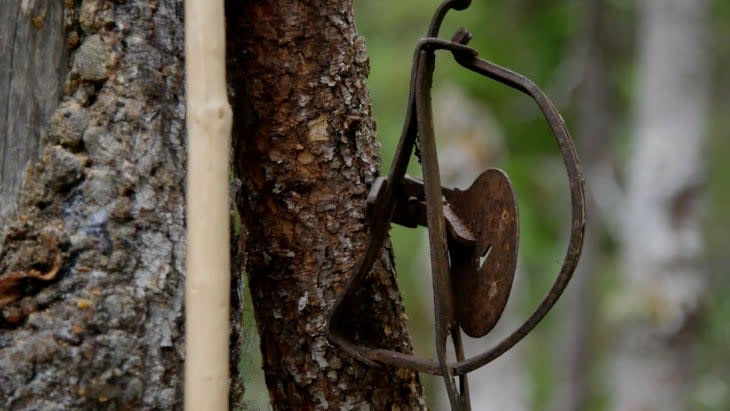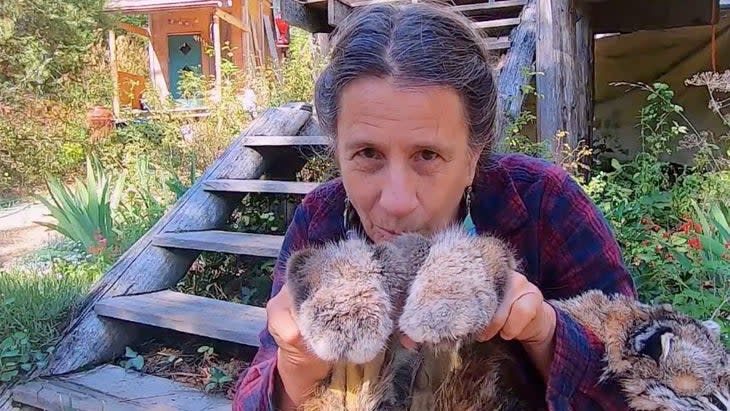Things Are Already Getting Weird on ‘Alone’
This article originally appeared on Outside
Envision the Tour de France peloton sitting at the starting line, preparing for three grueling weeks of biking across the Alps and Pyrenees. Suddenly, one rider dismounts his bicycle, walks into the forest, and reemerges astride a 1962 Ducati Scrambler motorcycle. In this bizarre scenario, the Tour allows riders to utilize anything they find along the roadside to help them reach Paris. The cyclist gleefully speeds ahead of the pack on his motorbike, leaving everyone else in his dust.
This vision popped into my mind as I watched the first episode of Alone's ninth season last week. Contestant Jacques Turcotte, a 23-year-old expedition guide from Alaska, was foraging for food when he found a spring-loaded animal trap--the type Elmer Fudd might hilariously step into while hunting Bugs Bunny. The Alone rulebook permits participants to salvage any man-made items they discover, and in previous seasons, contestants have built pontoon boats, fishing lures, and even a makeshift Jacuzzi from trash. But this was the first time an Alone cast member ever found a functioning tool ideal for catching rabbits, beavers, and other small game. Turcotte's find seemed like survivalist manna from heaven.

(Spoilers ahead.) So you can imagine my surprise while watching episode two when Turcotte became the first person to drop out, heading home after 15 days in the wild. His reasoning was twofold: the daily ritual of killing animals left him emotionally depleted, and he missed his girlfriend and dog.
This is not the first time an Alone contestant has wrestled with these psychological pressures. In season six, Ray Livingston of Vancouver, Washington, broke into tears after he killed and ate the chattering squirrel that had become his only companion along Canada's Great Slave Lake. "I betrayed him," Livingston said after devouring the rodent.
And, way back in season three, schoolteacher Jim Shields bailed after just three days in Patagonia because he missed his wife and two sons.
Still, Turcotte's departure marked one of the biggest twists in show history. It's no wonder that the TV cameras lingered on the trap dangling from a tree as Turcotte packed up his belongings and left.
Trapping small game may be the key to winning season nine. After two episodes, contestants are beginning to learn what food sources coastal Labrador, Canada, has to offer. The waterways are full of river trout, but the fish seem to come in two sizes: small and tiny. Feathery grouse flutter through the forests, and squirrels hop along the tree branches. While contestants have spotted piles of bear droppings, there's been no sign of big game like moose, deer, or musk oxen that might provide enough protein for weeks or months on end.
That's why I assumed the trap would have given Turcotte an unending supply of squirrel or rabbit meat--the motorcycle in the bicycle race. But Turcotte's short story arc taught me a new lesson about Alone: an advantage in eating does not guarantee one in the daily fight against isolation.
Last-Minute Preparations for the Wilderness
The opening episodes of any Alone season have a familiar ebb and flow, and thus far season nine is no different. We were introduced to the contestants in the field and then briefly whisked away to their homes, where we saw previously shot footage of them preparing to depart and saying goodbye to loved ones. Karie Lee Knoke, 57, bid farewell to her off-the-grid yurt; Tom Garstang, 35, said bye to his girlfriend; Benji Hill, 46, hugged his wife and daughter.

As it turns out, these farewell scenes are a bookend to a somewhat frantic period in the life of an Alone cast member.
Contestants learn they have been chosen anywhere from one and a half to two months before their departure date. Then, just a few weeks before they ship out, they discover their destination.
During this period, they're like college students cramming for an exam. When producers divulge the location, they research the local flora and fauna. They also brush up on their bushcraft skills like crazy and try to master whatever ones they may lack. Nicole Apelian, a contestant on seasons two and five, says she practiced making fire with a ferro rod and started carrying a sharpened survival knife with her wherever she went.
"I'd put cedar bark in water and spend hours each day working it with my knife to make kindling. I also practiced tying knots," Apelian says. "You want these skills to become ingrained, so that your muscle memory can just take over when you're tired and hungry."
Throughout this period, contestants also stuff themselves with food in an effort to build valuable fat stores. Jordan Jonas, the eventual winner of season six, knew that his wiry body placed him at a disadvantage, so he embarked on a gut-wrenching weight-gain regimen after learning he had been chosen.
"I tried drinking those Mass Gainer shakes but I got so sick of those," he told me. "So what I'd do is drink half a bottle of Ensure, then fill the rest of it up with olive oil, and chug the rest. I did that a few times a day."
Jonas says he put on 25 pounds in just one month.
Woniya Thibeault, who lasted 73 days during season six, took a different tack to prepare her body. Rather than stuff herself, Thibeault went on a ketogenic diet, with intermittent fasts and regular plunges into cold water, to prepare her body and brain for the periods of starvation and frigid temperatures she would face in the Canadian subarctic. Then, in the final weeks, Thibeault ate like crazy.
"A lot of people go out there cold, having never really gone without food for a long period of time, and the feeling catches them off-guard," she says. "The biggest thing I see when I watch the show now is that nobody practices going hungry and then having a lot of really physical things to do. That's the universal part of everyone's experience out there."
Finally, after the contestants depart, they spend a week together at the location before embarking into the woods. During this stretch, they meet the other cast members, take in last-minute intel on the location, and practice using the camera equipment. As it turns out, this final week isn't always fun.
Apelian said the cast for seasons two and five spent the week developing friendships and bonding. But Thibeault and Jonas said prickly attitudes and ego swirled within the group during season six.
"It was an odd dynamic," Jonas says. "You're trying to become friends but also you're in this competition, and it was hard to read if people were really being friendly or just trying to plug you for all of your information."
The Frontrunners
Turcotte's departure was another curveball to me, because I picked him as one of the stronger cast members after the opening episode. His background in ice climbing and Arctic expeditions gave him a leg up, since Labrador is covered in snow and ice in the winter.

Three other contestants caught my attention as potential frontrunners: Canadians Juan Pablo Quinonez and Teimojin Tan, and American Adam Riley. Quinonez recently completed a 100-day solo survival test in the frozen Manitoban backcountry--an experience that likely prepared him for starvation and severe cold.
Riley may not have the same backcountry skills as the others, but he has a background in tolerating isolation: in 2018 he sailed across the Pacific Ocean by himself, a journey that took 80 days. And then there's Tan, a doctor with a focus in wilderness survival. Tan is also a member of the Canadian army reserves, where he was trained in Arctic survival. On paper, he probably has the strongest resume in the woods.
But of course, therein lies the compelling nature of Alone. Survival training, past expeditions, and even salvaged animal traps can take a contestant only so far. At some point, everyone wants to go home.
For exclusive access to all of our fitness, gear, adventure, and travel stories, plus discounts on trips, events, and gear, sign up for Outside+ today.

